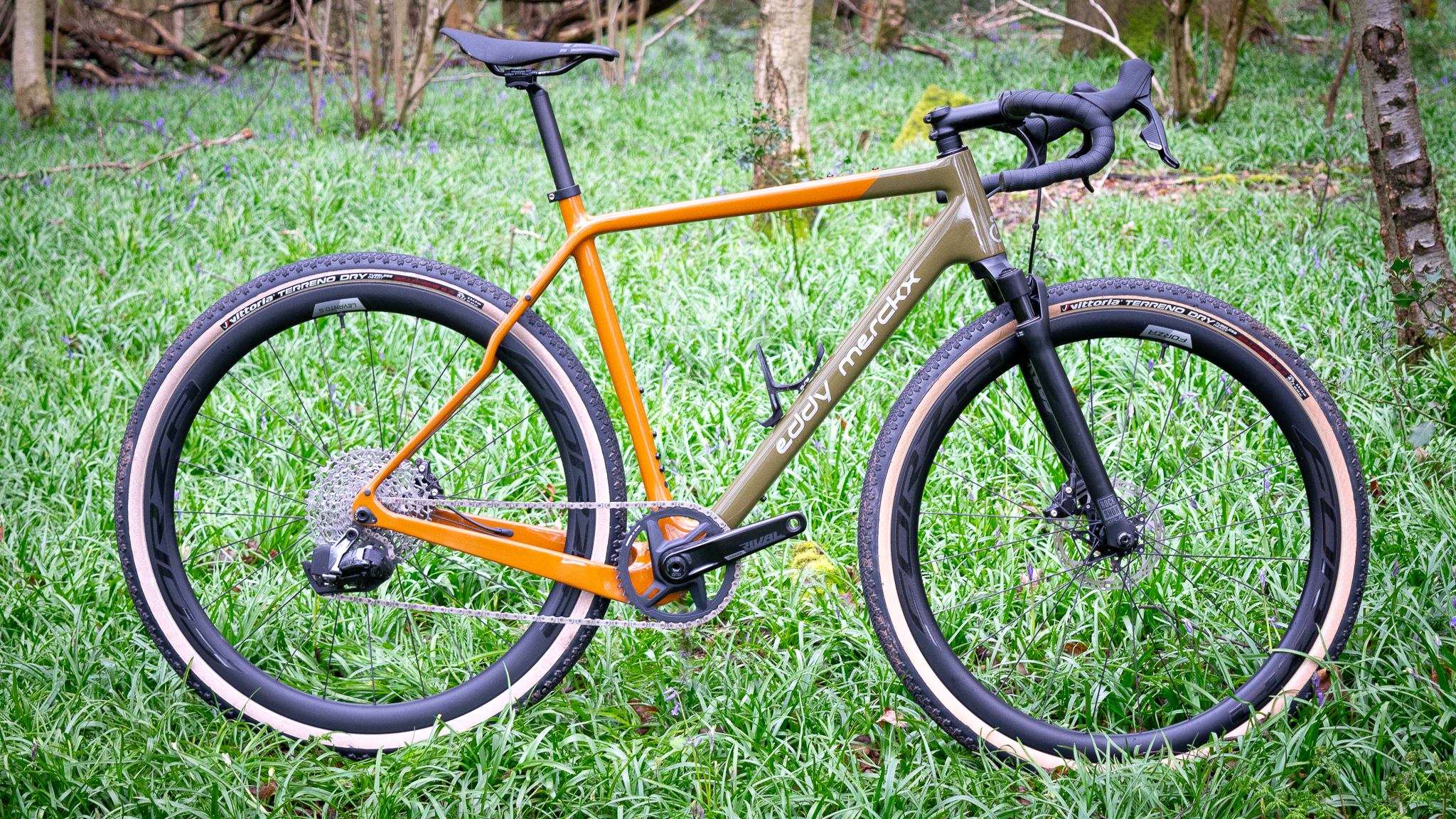
Frame: Carbon
Price: €5,498 (as pictured)
Frameset price: £2,799
Groupset: Sram Rival AXS XPLR
Fork: RockShox Rudy XPLR
Sizes: XS-XL
Weight: 9.2kg
Eddy Merckx bikes arrived back with a bang in January this year when the brand was relaunched. A new range of bikes was announced including road, all-road and gravel options available in steel, aluminium and carbon fibre.
Merckx bikes hadn't disappeared completely from the cycling landscape but the past several years had been quiet for the brand after being acquired by the Belgium Cycling Factory parent company which also owns Ridley bikes. This means Merckx bikes stay based in Belgium, surely the brand's spiritual home.
Belgium ProTeam Team Flanders - Baloise has raced on Eddy Merckx for the last few years, but the announcement in January represented a bigger, official launching of a larger Eddy Merckx range. I spent some time in the earlier part of this year riding the new Eddy Merckx Strasbourg carbon gravel bike to see how it shaped up. I'd never ridden a bike with that famous name on the downtube, and whilst I appreciate times have changed and Merckx isn't behind the brand anymore, it was still nice to finally swing a leg over a Merckx-branded bike.
The bike in question, the Strasbourg C (carbon) is, according to the brand, made for 'extremely challenging terrain' and is the right companion for rough and tough off-road rides. It's no secret a huge range of riding types and terrain falls under the gravel bike umbrella now, and it seems the Strasbourg is aimed at the more aggressive end of the spectrum.
Part of the Eddy Merckx range offering is custom spec options via the brand's website configurator. Customers can choose from a carbon frameset priced at £2,157, six off-the-peg build options, or a range of custom build and paint options to suit personal tastes and requirements.
The actual bike I tested featured a RockShox Rudy suspension fork and as I rode it the bike priced at €5,498 (+ €499 for the fork option over a rigid Carbon model) That's a decent lump of cash, and I was keen to see how the new bike rode and if it warranted the price tag.
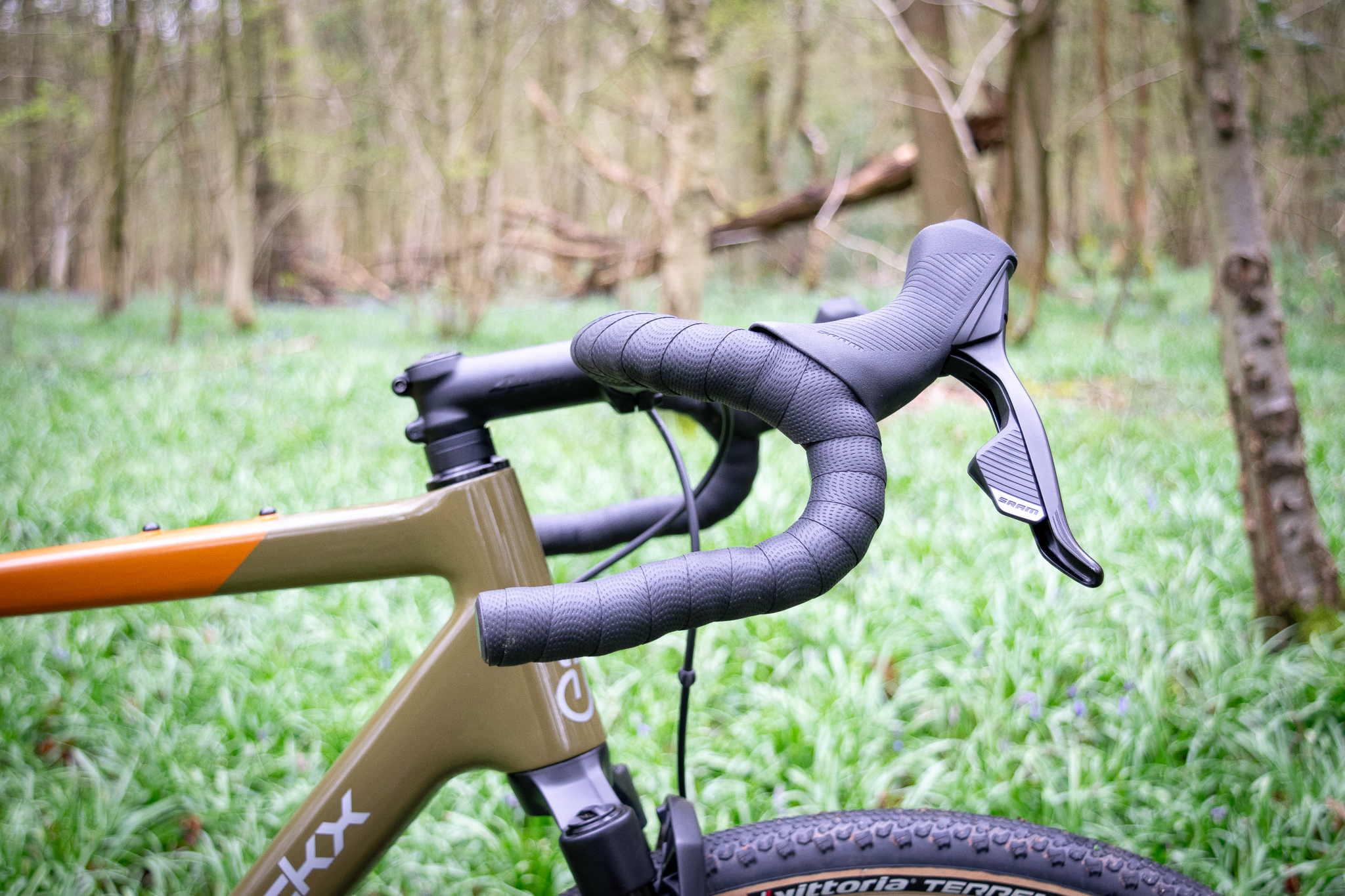
Design and Aesthetics
The Strasbourg model is according to the Merckx website an 'ode to an unforgettable stage victory in the 1971 Tour de France in which Eddy Merckx confirmed his class during a sprint against Roger De Vlaeminck on a dirt track.' It's a faint link, but a link nonetheless.
Interestingly the Strasbourg is currently the only gravel bike in the Merckx lineup but is available in steel, aluminium, and the carbon version we are looking at here. It's also I suspect a slightly easier and/or cost-effective way of doing things if you're rolling out a brand-new bike range. Although the same model in name, the material properties themselves and spec options on offer should provide a decent amount of difference between each version of the bike and bring out different ride and performance qualities.
Merckx sent me a test build of the Strasbourg to ride which was fitted with a RockShox Rudy suspension fork, the other option is a 4ZA Oryx carbon disc fork. The Strasbourg as I understand it will be available with a suspension fork option in time, but this is still unavailable on the website configurator.
There are as mentioned six off-the-peg spec options to choose from with a range of electronic and mechanical components. Prices start at £2,799 for a Sram Rival 11-speed build and rise to £4,999 for a Shimano GRX800 di2 model.
My test bike build comes in at €5,498 with the Rudy fork option, which adds €498 to the total price. Build-wise, my bike featured Sram Rival AXS 12-speed groupset with a 42T ring up front and 10-44T cassette. Forza Levanto carbon wheelset, Vittoria Terreno Dry 47mm tyres, Ritchey Venture Max Comp bars rounded out the finishing kit along with a San Marco saddle.
The Strasbourg frame features 48mm tyre clearances and refreshingly a 27.2mm round seatpost and standard seat clamp, along with external brake hoses and a non-proprietary handlebar and headset arrangement. This means headset services will be nice and easy; useful after muddy riding and bike washing. But also it means changing out things like handlebars, stems, and seatposts, should you need to, is cost-effective and easily achieved.
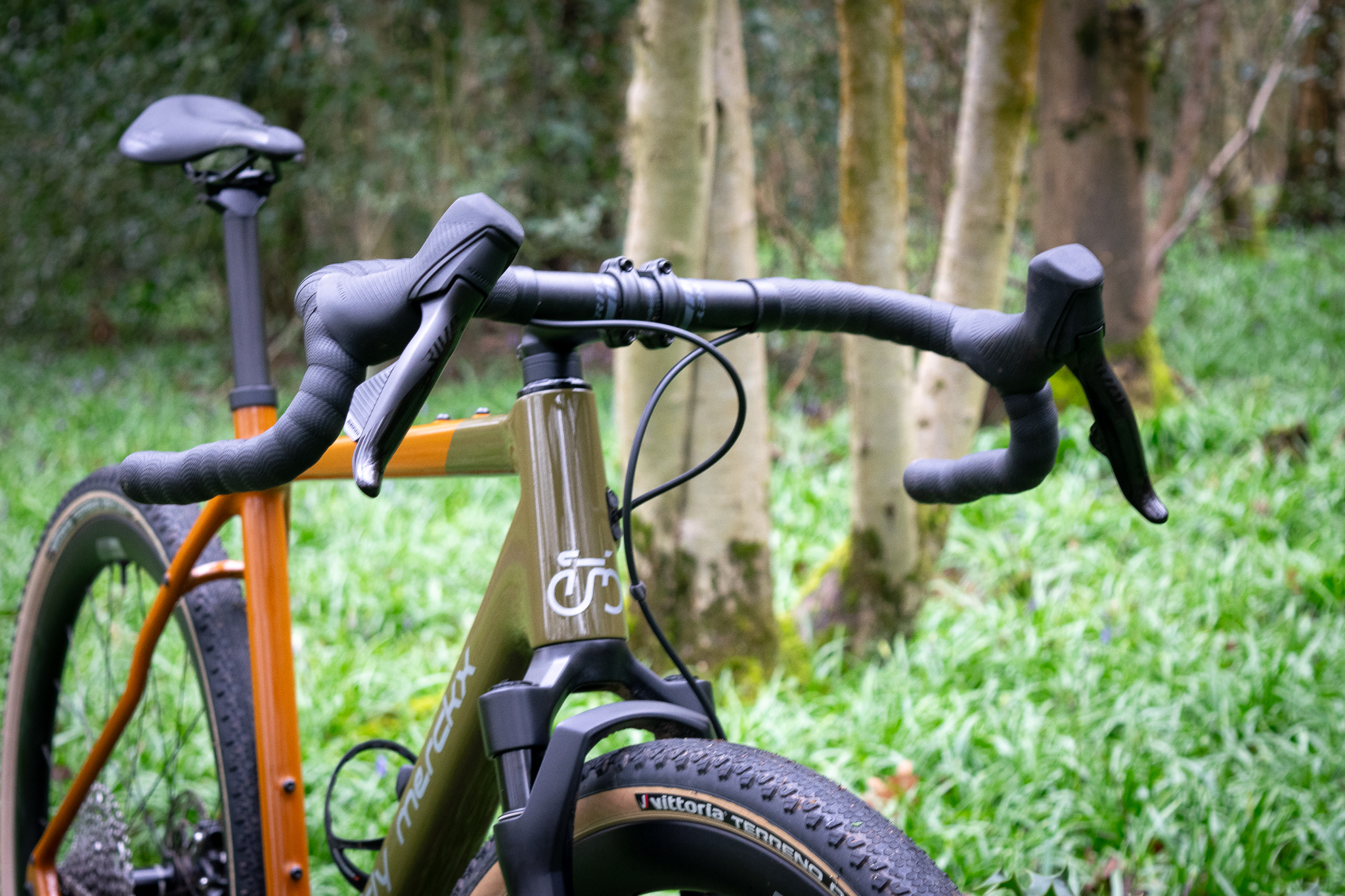
I rode a size 54cm Strasbourg and geometry-wise the stack and reach numbers for the bike are 568 and 376 respectively. The stack number is exactly the same as on The YT Szepter Core 4 size small model I tested back in 2022 and that is a similar aggressively positioned gravel bike with a suspension fork that I got on well with riding hard off-road.
The Strasbourg features a 71.5-degree headtube angle and a 73-degree seat-tube angle. A touch slacker at the seat tube and steeper in the head angle than the YT, making it feel a little more sprightly on the road. I feel the Strasbourg geometry numbers strike a blend between off-road aggression and efficiency on milder terrain. It's also worth remembering this bike can and will be specced with a rigid carbon fork so there has to be a balance in the numbers I feel. Stem options for the bike also range from 90-120mm. Given the shorter frame reach numbers I think this works out on the money, though customers, of course, could spec a different length stem of their own easily.
The Strasbourg frame itself features three bosses on the down tube, two on the top tube, , two on the seat tube, front and rear mudguard mount points, and the rigid carbon fork option also has three bosses per leg. Adding extra water bottles, luggage or mudguards for winter duties wouldn't be an issue. There is also a two-year warranty, which extends to three with product registration.
Aesthetics-wise, I liked the gloss camo green and orange paint job my bike arrived with and it felt fairly on trend gravel-wise. There are several stock paint options to choose from or you can go full custom paint at no extra cost. The frame lines and tube shapes are pretty classic looking overall, there aren't any dropped seat stays or aggressive profiles and I like the way the frame presents overall. The kinked seat stays may divide opinion and created a debate amongst my riding mates but I don't take much issue with them.
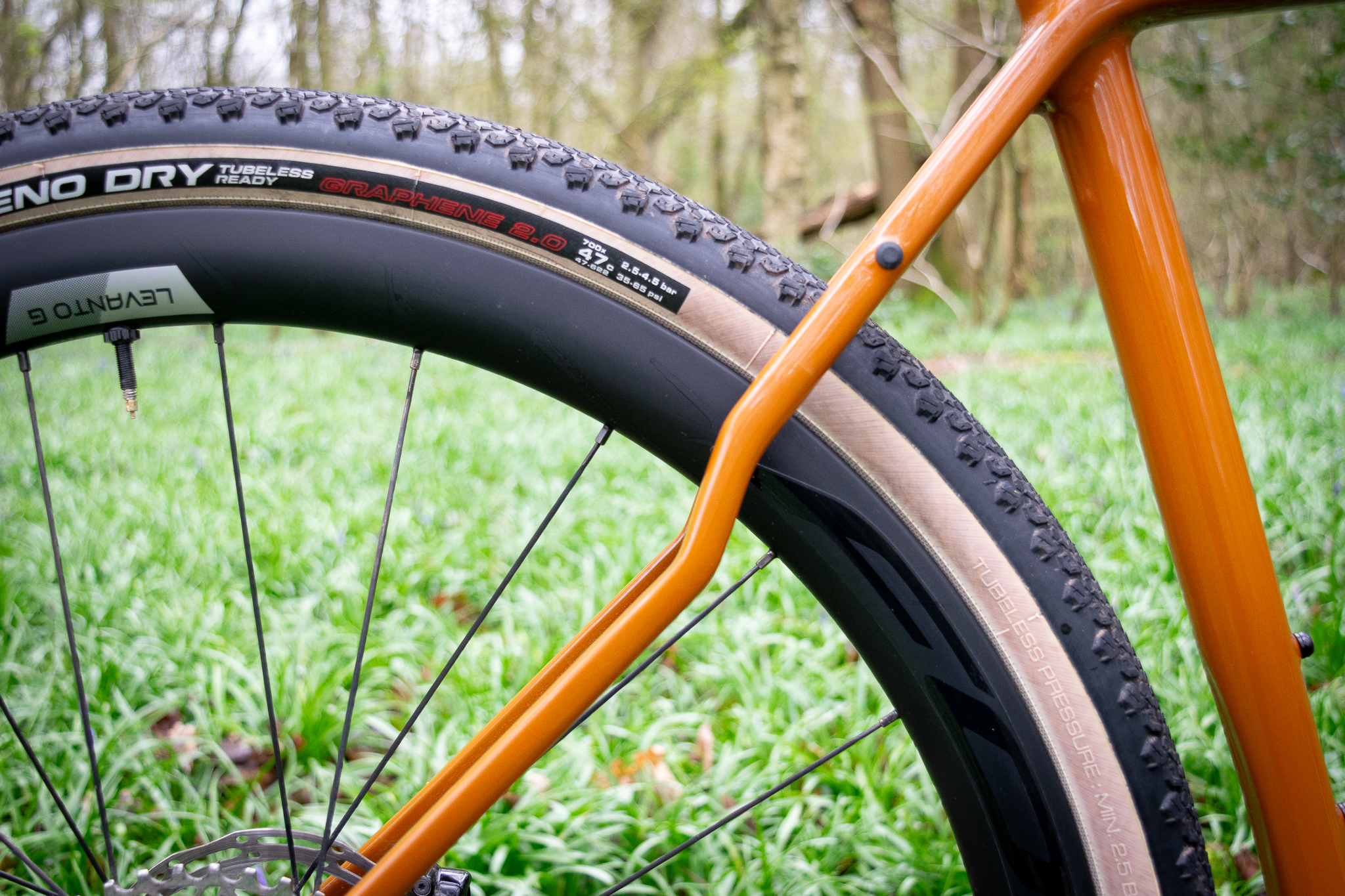
Performance
My first off-road ride on the Merckx involved some typically muddy and slick British winter conditions and I probably tried to bite off a bit more than the Merckx, in its current guise, could handle in my local woods. Wet and very muddy conditions proved a little too much for the 47mm Terreno Dry tyres and I struggled with a serious lack of grip. My local riding features some XC mtb trails and plenty of muddy woodlands and if I was riding the Strasbourg through a British winter and speccing a suspension fork, I'd want some aggressive rubber so I could enjoy things more off-road.
In dryer spring weather I also tried to tackle as much technical off-road riding as I could on the Strasbourg. Unless it's a no-compromise race bike, I like a gravel bike to be able to deal with this kind of terrain and it also importantly tests what this bike is about. Steeper trails and technical terrain were dealt with well and in the tackier, dryer conditions the Terreno tyres provided more grip.
I tested the bike repeatedly on a fast minute-long descent which starts open and fast and culminates in a steep, narrow rocky gulley which requires a couple of quite specific line choices to get set up for. I rode this descent several times in a row pushing the bike hard each time and it felt stable at speed and hooked into the drops I felt confident on the technical lower parts of the descent.
A tarmac climb leads back to the top of this off-road descent and it made for a useful off-road/on-road comparison. The Merckx feels sprightly enough on the climbs, yet I felt confident I could get stuck in and hammer it back downhill. It also served as a reminder I feel that gravel bikes with 40mm suspension forks really don't feel as sluggish on the road as a lot of us might assume they do, myself included. Every time I ride one, I realise that unless all-out speed is your goal, it doesn't feel like it's holding you back too much.
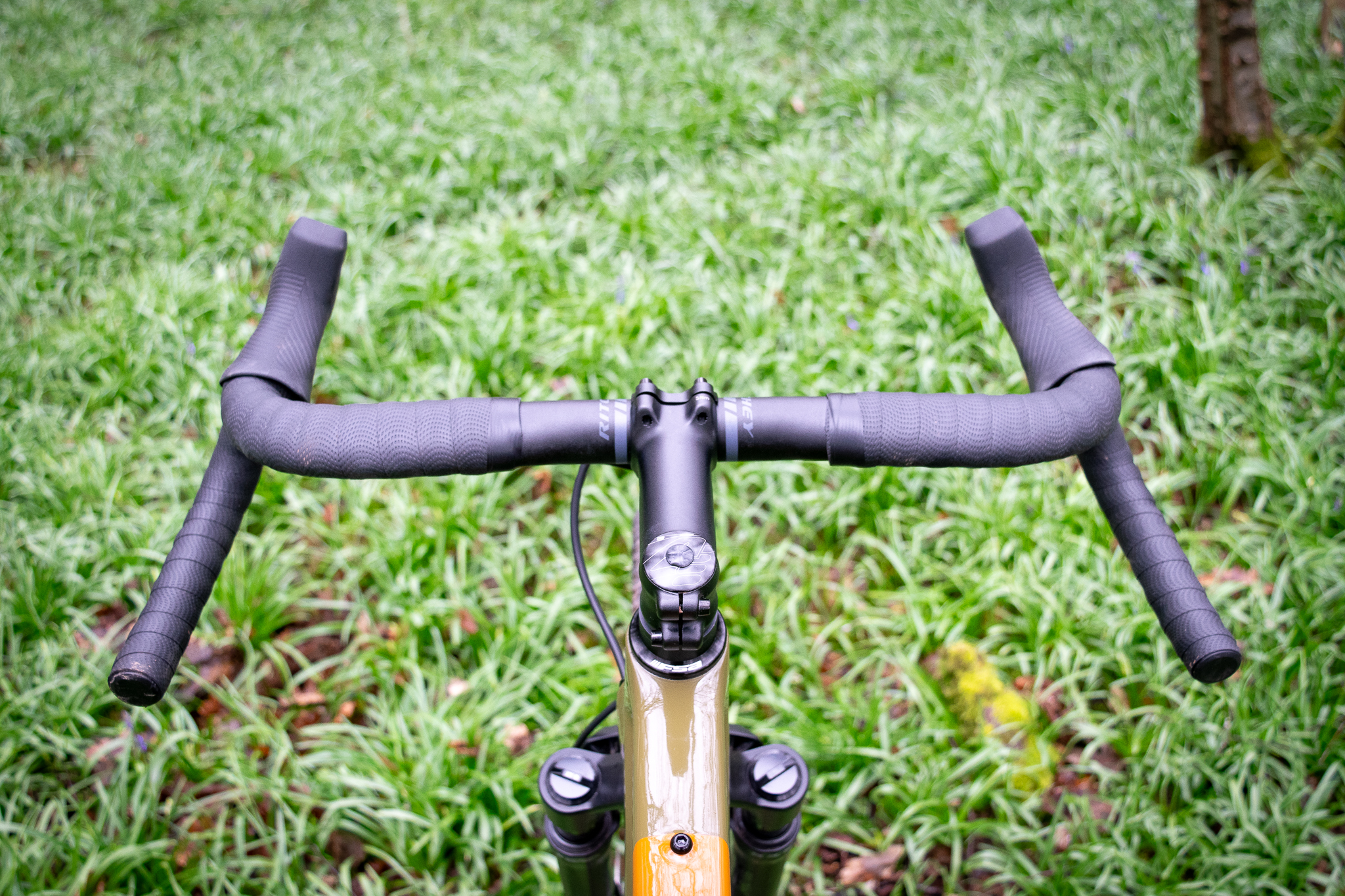
The Merckx hums along well on the tarmac too. Longer, road-only rides were a good test for this and the bike climbed well. I didn't feel the non-lockout option on the Rudy fork detracted from out-of-the-saddle climbing or speed on the flat particularly, in the context of a general road ride, not going hard. The tyre and wheel combo on my bike make for a fast combination and the Vittoria Terreno Dry tyres zip along quickly at higher pressures on the road.
I also found it easy to hook into an aero position on the Sram hoods, which were angled in to follow the flare of the Ritchey bars. I got more used to the Ritchey flared bars as time went on and they suit a range of riding, but for me, a narrower, unflared bar feels more confidence-inspiring when riding technical terrain. I would look to swap this and it could be easily done at purchase using the configurator.
The Merckx doesn't have the all-out stiffness or racy feeling of some of the fastest gravel bikes out there so if you're in the market don't expect it to feel like a race bike. I felt it was still nippy on the road and lighter gravel and provided an entertaining ride, but the geometry and performance were up to the task when I pushed things off-road.
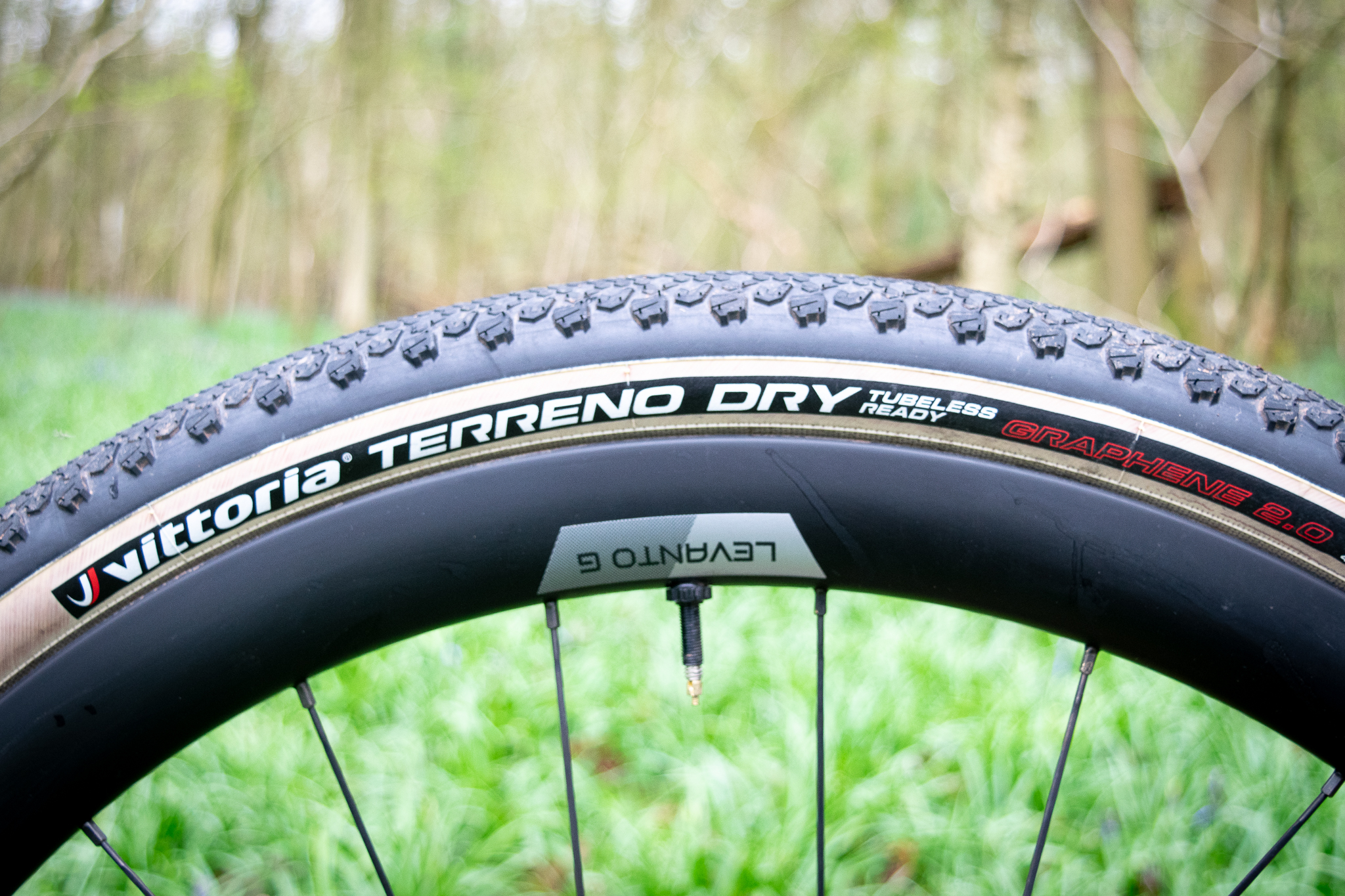
Value
Despite liking the bike and enjoying its ride qualities I can't help but feel it's a little bit on the expensive side at €5,498 as reviewed. For some comparison as it's a similarly positioned bike, the top-spec YT Szepter Core 4 with top-spec Rudy Ultimate fork, Force AXS and AXS dropper (but no carbon wheels) is available for €4,000 at the moment whilst a host of Canyon Grizl offerings, some with Rudy forks sit under the €5,000 mark.
That said, I acknowledge Canyon's direct-to-consumer model in particular allows for very competitive pricing. But Merckx does offer a large dealer network for help and aftermarket care via Belgian Cycling Factory and a range of custom spec and paint options at purchase which helps.
It's a solid bike, but if people are shopping around they may well find more competitively priced options. Aside from the good performance, if the allure of a Merckx-branded bike and custom options does it for you, maybe this will swing it.
Verdict
I liked the Strasbourg and have enjoyed riding it, it's a solid all-around gravel bike and dealt with aggressive off-road riding well. It was stable at speed and dealt with steep, challenging terrain with confidence. With road tyres and mudguards which you also have the ability to fit, it would also make a solid winter bike adding extra value to the purchase.
The bike is billed as being for aggressive off-road riding though and given the USP I think things could head in the aggressive direction a bit more to further align performance with the Strasbourg model description.
For the bike to fully live up to its aggressive billing, I think a few component tweaks to take things further in this direction would help. I would be plumping for the Vittoria Mezcal tyres on the configurator for a start - you could, of course, fit different or more aggressive rubber of your own. It would also be nice to see a Sram AXS dropper add-on option which would be useful for aggressive riding and would help the bike measure up against other aggressive off-road gravel bikes on the market. The suspension fork option is coming soon as an option, so perhaps some more aggressive spec choices will join it.
The man himself may not be heading up the operation anymore, but I like seeing that name on the down tube live on. If potential consumers feel the same then the Merckx Strasbourg may be an attractive proposition despite there potentially being cheaper, similarly specced bikes out there. It's not the exact spec I would choose if I was using the bike for aggressive off-road riding, but there is a good frame and geometry at the heart of the Strasbourg carbon which feels at home both on the road or riding aggressively off it, the specific direction you want to take your build in is completely up to you.







